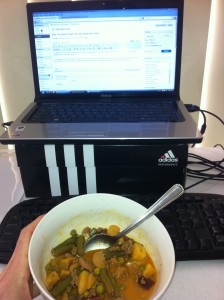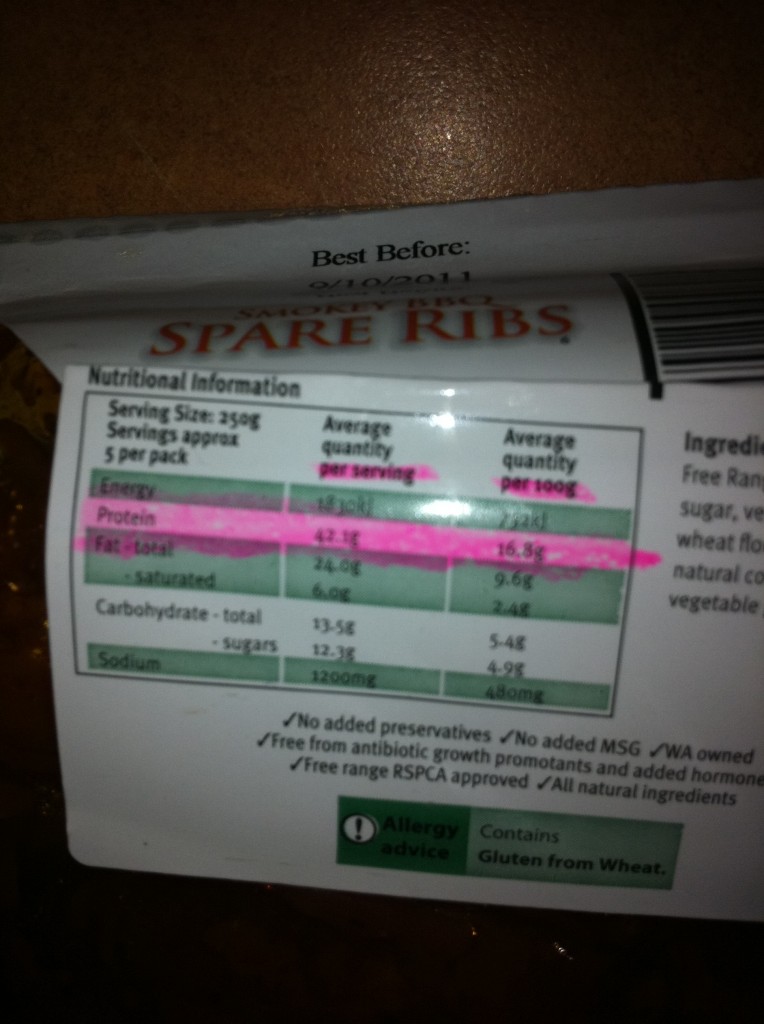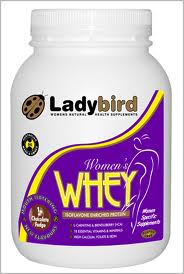 I’m sitting at my computer typing this up while eating a breakfast that you probably think is rediculous. But I am enjoying my beef and vegetable curry with apple mixed in!
I’m sitting at my computer typing this up while eating a breakfast that you probably think is rediculous. But I am enjoying my beef and vegetable curry with apple mixed in!
Rediculous? Maybe.
Delicious? Absolutely.
Will it help me drop body fat? Sure will.
Does it comply with the food rules? Yep
So lets recap them so far.
1. Take fish oil and a multi vitamin every day.
2. Eat at least 5 serves of vegetables every day plus 2 fruits.
And for today here’s rule #5 …
Eat Lean Protein With Each Meal or Snack.
Good sources of protein are fish, eggs, lean meats and protein powder. Other protein sources such as low fat dairy, nuts and seeds and legumes all are good in moderation, but remember they also contain carbs and/or fat.
Why Protein at Each Meal?
Because it will help you achieve the best health, best body and best performance from taking adequate quantities.
Protein helps your body build or maintain muscle, increase your metabolic rate and helps you feel full so you don’t over eat.
Protein when eaten with carbs also helps to ‘blunt’ the insulin spike that comes from carbohydrate intake, which means you wont get a massive sugar rush and then crash 10-30 minutes later and be hungry again.
Have you noticed that when you eat only carbs as a snack you are hungry again in no time?
That’s the body releasing a ton of insulin all at once.
Compare this to eating both protein and carbs at a meal and you will be fuller longer and have sustained energy.
 How Much Protein Is Enough?
How Much Protein Is Enough?
Women – Try to get 20-30 grams of protein (60-100g of cooked meat) at each main meal.
Men – Try to get 30-60 grams of protein (100-170g of cooked meat) at each main meal.
You don’t want to weigh your meat each meal so just eat serve about the size and thickness of your palm.
If you’re taking a protein shake then just check how much protein is provided per serve.
For fish, a serve is about the size and thickness of your whole hand.
One egg is between 6 and 8 grams of protein.
If you are unsure how much protein is in your food, read the label.
I have highlighted the protein content on my BBQ chicken ribs label to the right. You will notice that there are 2 columns – per serve and per 100g. If you ever want to compare foods make sure you compare 100g to 100g because a serve isn’t always a serve.
What About Protein In Snacks?
 For those looking to lose weight, the easiest way to get enough protein as a snack is to drink a protein shake mixed in water. However, it is not sustainable forever, but will certainly speed up results in the short term as long as you’re not eating too much!
For those looking to lose weight, the easiest way to get enough protein as a snack is to drink a protein shake mixed in water. However, it is not sustainable forever, but will certainly speed up results in the short term as long as you’re not eating too much!
You don’t have to snack. You could have 4 main meals each day and eat a similar thing each time. But not everyone can/should eat meat at each meal, so here’s some other alternatives for snacks.
Eggs, cottage cheese, low fat natural yoghurt, low fat cheese, whey protein, casein protein and milk protein.
For vegetarian options you can have tofu, soy burgers, soy bacon, soy sausage, tempeh, seitan, etc.
Some people can get away with eating nuts as a snack, but because they are relatively low in protein, you must be getting larger serves of protein at your main meals. At the moment I am one of these people, but when I start to train hard my protein intake will shoot up again and nuts will no longer suffice as a snack.
When You Are Eating More Protein, You Will Find It Much Easier To Eat Less Other Carbs.
You won’t crave as much bread, rice, pasta, potatoes, etc, because you will feel more full. This will make it much easier to comply with rule number 3. Eat other carbs only after exercise. And if you have adequate fruit and vegetable intake you’ll not crave the other carbs so much either.
So check your protein intake and start taking the steps to swapping other carbs for more protein in your diet. It may take some planning, but you’ll reap the benefits in the short term and in the long term.
